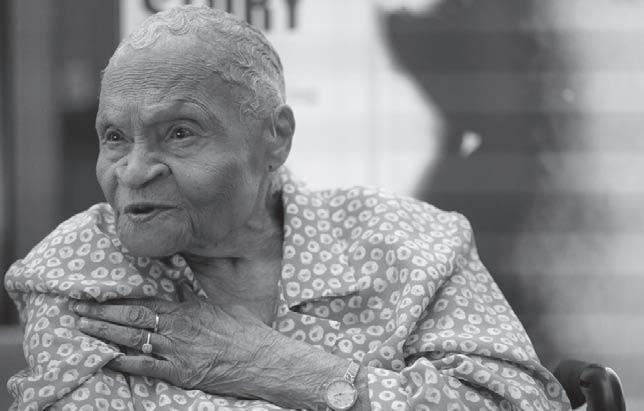
10 minute read
Viola Ford Fletcher, oldest living Tulsa Race Massacre victim, publishes memoir Time Manila eyes financial benefits for PWDs below 18 years old
By Roderick Abad Contributor
Vice Mayor John

Manila constituents.
“All the ordinances crafted by our councilors, the City Council, will be one click away for every Manileño,” he said.
As the highlight of the council’s 122nd founding celebration, an anniversary program will be held on July 31 at Ayuntamiento de Manila. The program will reminisce the early beginnings of the council amid its journey towards being future ready. Awards, rewards and plaques of recognition will be given to past and present council officials and employees for their service, loyalty, and contributions that made a positive impact on the council.
July 4, and becomes widely available for purchase on august 15. AP Photo/MAry
By Aaron Morrison AP National Writer
NeW YORK—Being a centenarian hasn’t slowed down Viola Ford Fletcher’s pursuit of justice.
In the last couple of years, Fletcher has traveled internationally, testified before Congress and supported a lawsuit for reparations—all part of a campaign for accountability over the massacre that destroyed Tulsa, Oklahoma’s original “Black Wall Street” in 1921, when she was a child.
Now, at age 109, Fletcher is releasing a memoir about the life she lived in the shadow of the massacre, after a white mob laid waste to the once-thriving Black enclave known as Greenwood. The book will be published by Mocha Media Inc. and becomes widely available for purchase on August 15.
In a recent interview with The Associated Press, she said fear of reprisal for speaking out had influenced years of near-silence about the massacre.
“Now that I’m an old lady, there’s nothing else to talk about,” Fletcher said. “We decided to do a book about it and maybe that would help.”
Her memoir, “Don’t Let Them Bury My Story,” is a call to action for readers to pursue truth, justice and reconciliation no matter how long it takes. Written with graphic details of the 1921 Tulsa Race Massacre that she witnessed at age seven, Fletcher said she hoped to preserve a narrative of events that was nearly lost to a lack of acknowledgement from mainstream historians and political leaders.
“The questions I had then remain to this day,” Fletcher writes in the book. “How could you just give a mob of violent, crazed, racist people a bunch of deadly weapons and allow them—no, encourage them—to go out and kill innocent Black folks and demolish a whole community?”
“As it turns out, we were victims of a lie,” she writes.
Tensions between Tulsa’s Black and white residents inflamed when, on May 31, 1921, the white-owned Tulsa Tribune published a sensationalized news report of an alleged assault by a 19-year-old Black shoeshine on a 17-year-old white girl working as an elevator operator.
With the shoeshine under arrest, a Black militia gathered at a local jail to prevent a lynch mob from kidnapping and murdering him. Then, a separate violent clash between Black and white residents sparked an all-out war.
Over 18 hours, between May 31 and June 1, the enlarged mob carried out a scorched-earth campaign against Greenwood. The death toll has been estimated to be as high as 300. More than 35 city blocks were leveled, an estimated 191 businesses were destroyed, and roughly 10,000 Black residents were displaced.
In her memoir, Fletcher writes of the bumpy ride out of town in a horse-drawn buggy, as her family escaped the chaos. She witnessed a Black man being executed, his head exploded like “a watermelon dropped off the rooftop of a barn.”
The shooter had also fired his shotgun at her family’s buggy.
“We passed piles of dead bodies heaped in the streets,” she writes in the book. “Some of them had their eyes open, as though they were still alive, but they weren’t.”
Victims’ descendants believed that, once the conspiracy of silence around it was pierced decades later, justice and reparations for Tulsa’s Black community would follow. That hasn’t happened just yet—Fletcher and two other centenarian survivors are currently plaintiffs in a lawsuit against the city of Tulsa.
Ike Howard, Fletcher’s grandson and co-author of the memoir, said systemic racism has prevented Tulsa’s Black community from fully recovering from the massacre.
“They want to be made whole,” Howard said. “We speak for everybody that went through a similar situation, who are not here to tell their stories.”
“You can learn a lot from ‘Don’t Let Them Bury My Story.’ And we know that history can repeat itself if you don’t correct and reconcile issues,” he added.
Fletcher notes in her memoir just how much history she has lived through—from several virus outbreaks preceding the coronavirus pandemic, to the Great Depression of 1929 and the Great Recession of 2008 to every war and international conflict of the last seven decades. She has watched the Rev. Martin Luther King, Jr. lead the national Civil Rights Movement, seen the historic election of former President Barack Obama and witnessed the rise of the Black Lives Matter movement.
In 2020, Howard purchased his grandmother a brand new color TV for her birthday. Several months later, on January 6, the images of the mob attack on the US Capitol following the historic election of President Joe Biden and Vice President Kamala Harris retraumatized her.
“With that horrific scene, all of what occurred back in 1921 in Greenwood came flooding back into my mind,” Fletcher writes in the book.
In the AP interview, Fletcher attributed her active lifestyle at an advanced age to her reliance on faith and family. While in New York last month to publicize the book with Howard and her younger brother, 102-year-old Hughes Van e l lis, Fletcher saw the cover of her memoir advertised on jumbo screens in Times Square.
Van ellis, a massacre survivor and World War II veteran whose words from his 2021 testimony to Congress serve as the foreword to his sister’s memoir, said he believes justice is possible in his lifetime.
“We’re getting pretty close [to justice], but we aren’t close enough,” he said. “We’ve got a lot more work to do. I have to keep on battling. I’m fighting for myself and my people.”
According to him, this ordinance is already pending in the 12th City Council of Manila, whose members are studying if the city government’s budget can afford to also give social amelioration or city allowance to PWDs aged 17 years old and below.
“That will be a big help for them,” he said in an interview on the sidelines of the Nation Builders and Mosliv Awards (NBMA) 2023 recently held at the Okada Manila in Parañaque City.
Currently, PWD residents in the country’s capital who are 18 years of age and above receive P500 per month from Manila’s Department of Social Welfare.
“Data on the number of minor
PWDs are still being gathered,” he said when pressed on the latest population of young PWDs in the city.
He added that they may consider raising the amount if ever the differently-abled youngsters in the city are not as many as their senior counterparts.
“This is because our PWD children mostly need our care,” the vice mayor said.
Nieto added that the City Council, through an ordinance passed by Sixth District Councilor Philip Lacuna, is pushing for a P3,000 to P5,000 burial assistance to all Manileños.
“This year, that ordinance is being studied thoroughly. It will be referred for fast approval of the Council,” he said.
In the upcoming 122nd Founding Anniversary celebration of the Manila City Council on July 31, the vice mayor bared that they will launch their web site, citycouncilofmanila. com.ph, wherein all the laws of the LGU will be readily available online. This is part of the city government’s digitalization program to facilitate transparency and accessibility for
Will the real adults please stand up?
By Nick Tayag
my sixty-zen’s WORtH
ASUPPOSeDLY mature lawmaker unabashedly sheds tears in public like a little boy accused of misdemeanor in class. Another legislator casually clips or grooms his mustache while conducting a public hearing, even as video cameras are documenting the proceedings. A pastor-leader of a religious community exalts himself to high heavens with all kinds of conjured divine titles, claiming to have supernatural powers.
Consider the former US President who lost in the last elections and is still being very much in the limelight. All he cares about is being admired and looked up to as the Best Person in the World. For years we’ve known that there’s something wrong about this man’s character.
An article in the reputable magazine Psychology Today (May 12, 2017) says that after a thorough evaluation, psychological scientists have concluded that “he is a four-year-old.” Yet he is already in his late 70s.
It’s becoming a widespread phenomenon: elderly men who possess the outward appearance and trappings of adulthood but who are on the inside predominantly just children. We have native terms to describe these supposedly adult individuals: “Isip bata” or “tumatandang paurong.”
The sad thing is they don’t realize they are in arrested development stasis.
This is why I utterly agree with what a professional psychologist has pointed out: Emotional maturity has nothing to do with age
My fear is that we are becoming a nation led by kids in adult bodies. And we are allowing them to play with our lives.
But are we not supposed to keep the “child in us” alive even in old age as psychology experts and motivational gurus have been telling us?
The answer is: be childlike, not childish. Aye, there’s the rub.
When we say inner child, we actually refer to that sense of wonder, fun and curiosity intrinsic in every child that believes and imagines the most fantastic things. Being childlike also means to be simple, pure, and honest. On the other hand, childish means being narcissistic, selfish, irresponsible, tactless, and putting a tantrum when things don’t go our way.

Two thousand years ago, St. Paul stated it very well: “When I was a child, I spoke as a child, I understood as a child, I thought as a child; but when I became a man, I put away childish things.” As we grow up and mature, as we are trained and disciplined, we should leave childish ways behind.
Dismayingly, many of us are guilty of fostering and encouraging perpetual immaturity. As parents, we have unknowingly been stunting the emotional growth of our children. That’s because we have not grown up ourselves. We play their little games. We ca- ter to their selfish desires. When young kids crave for attention on social media, we allow and even help them to get attention, rather than the substance that they need to grow. We keep buying the latest digital toys they want because we’re afraid they’ll be left behind by their generation, FOMO (fear of missing out) as young people call it.
Or worse, some parents love to have “toys for the big boys” themselves. I know one father who likes to bring boxes of chocolates for his kids. But he consumes half of them himself. Parents are forgetting that children take after them. Parents teach by their actions, and these can influence their growth for better or for worse.
Psychologist and writer Dr. Nicole LePera says that the level of our emotional maturity comes from how our developmental needs were met as children. And, the modeling we get from our parent figures who teach us how to navigate our emotions. Take the case of one person whom I personally know very well. Let’s call him JT. He’s now in his early 40s, and according to sociologists, at this age, your main focus should be getting ready for your retirement. That means cutting down on debt and increasing retirement savings, and making sure your family is well taken care of and you’ve prepared for any worstcase scenarios. This is also the time for you to find purpose in midlife through meaningful activities and engaging in creative pursuits.
That’s not the case with JT. His main preoccupation is collecting expensive 4 wheelers and 2 wheelers. He likes to show off his new possessions on social media, tagging his buddies as if he is competing in a game called “look what I got” or “beat that.”
As if to compensate for the comforts that he was deprived of during his growing up years, JT is working long hours to earn as much as he can by any means to be able to lavish his family with material abundance and luxuries such as signature clothes, dining in expensive restaurants, staying in 5-star hotels, enrolling them in elite private schools and so on.
For the second time, Nieto was one of the “Awarded Vice Mayor of the Year” recipients at the NBMA 2023.
In line with the United Nations’ Sustainable Development Goals, this leading Sustainability Awards Festival in the country honors leaders from both the public and private sectors, youth groups, philanthropists, and sustainability organizations that have pitched in to nation-building through their programs, advocacies and prospects.
“I’m happy that my job as the vice mayor of Manila is once again recognized by the Nation Builders and Mosliv Awards. It inspires me to improve more on my duties as the City Council’s presiding officer and also as vice mayor,” he said.
Most recently, he posted pictures of his family going on a luxury cruise to Mexico.
But what in fact makes an adult “mature”?
Gordon Allport, an influential American psychologist, says that one of the personality traits characterizing a healthy mature personality is a capacity to manage emotion as well as the ability to go beyond self-preoccupation and to have concern for others. In his mind, he occupies such a central place that he is unable or finds it difficult to see a situation from another person’s point of view.
In contrast, a “childish” adult doesn’t have that ability. At the core of his childishness you will find what I call “Self at the Center.” The usual manifestations are pride, self-exaltation and selfgratification. One characteristic is the inability to see much beyond his own ego preoccupations. And if a person can’t laugh at himself, that’s a red flag.
I’ve suffered my share of the ordeal of putting up with these childish fools. They come in a variety of shapes and sizes. He or she could be your boss or a colleague or friend or an elected politician. Many are physically attractive, that’s why they are adulated and they often get their way. They are enabled by sycophants who continuously feed their vanities with phony praises while siphoning off them.
It’s time to shut them off. Let’s start by calling out parents who refuse to grow up. Let’s stop giving immature, entitled, self-centered politicians public platforms on which to perform their childish acts. Let’s take away their unearned “honorific titles” and the emblems of office that are really meant for mature respectable adults. Let’s press the mute button on so-called pastors and religious leaders with outsized egos, who prattle about spiritual transformation and salvation while getting enriched and enjoying lives like rich pampered kids. Oh where oh where are the real mature adults now that we need them?
Editor: Mike Policarpio
Saturday, July 29, 2023






